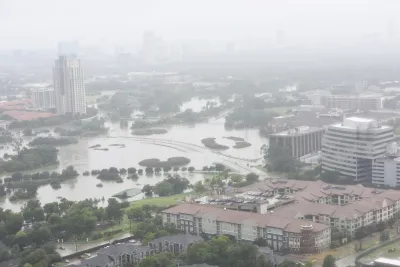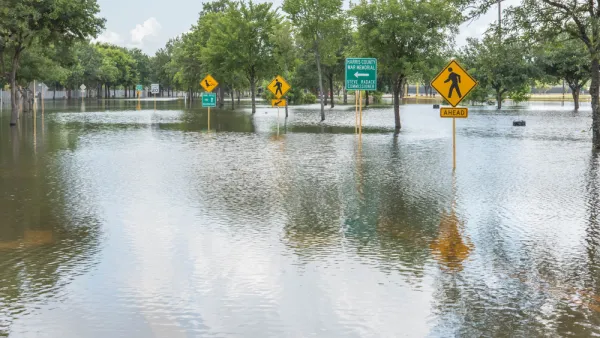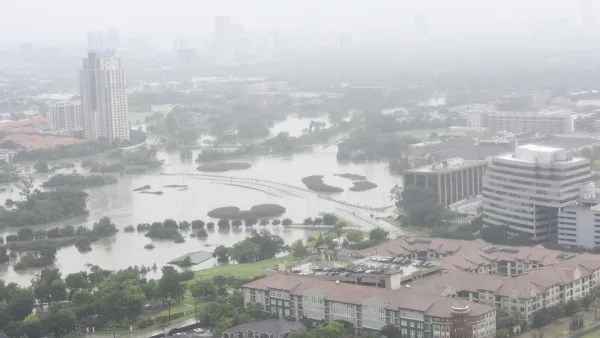As Houston's flood waters recede and attention turns from rescue to recovery and soon rebuilding, critics have pointed to the city's lack of zoning as the cause of the devastation. But are they looking in the right direction?

"As we watch Houston struggle with the catastrophic flooding associated with Hurricane Harvey’s biblical levels of rainfall, it is easy (from a safe distance, anyway) to get judgmental about the city’s famous lack of land-use planning," writes Ed Kilgore, political columnist for New York Magazine.
Houston legendarily has no zoning. The resulting haphazardness of its patterns of development, we may imagine, make the city a sitting duck for all sorts of disasters.
But doesn't a lack of zoning cause sprawl? If that was the only contributor, Planetizen's sprawl tag would only have articles pertaining to America's fourth largest city.
It’s true that Houston’s sprawl does invite problems, but it’s only partially true that the sprawl is a result of its lack of zoning...But the bigger problem is a lack of regional planning. Development has overwhelmed the city’s World War II–era reservoir system of flood control and consumed the wetlands that absorb excess rainwater.
Kilgore cites the now much-referenced ProPublica series, "Hell And High Water: Preparing Houston For The Next Big Storm."
"In Harris County alone, research by Texas A&M scientist John Jacob shows, almost 30 percent of freshwater wetlands were lost between 1992 and 2010, a figure he calls 'unconscionable,'" wrote three reporters: Neena Satija, The Texas Tribune and Reveal; Kiah Collier, The Texas Tribune; and Al Shaw, ProPublica.
Another insightful piece questioning the culpability of Houston's lack of zoning for the disaster was written by Henry Grabar, a staff writer for Slate’s "Moneybox."
The most important thing is this: No city is or should be designed to accommodate a one-in-a-million-year flood, which is what Harvey turned out to be.
For more discussion on whether zoning would have helped Houston whether the epic flooding caused by Hurricane Harvey, see blog post by Planetizen contributor Michael Lewyn.
FULL STORY: More Zoning Wouldn’t Have Protected Houston From Harvey’s Fury, But Less Sprawl Would Have Helped

Analysis: Cybertruck Fatality Rate Far Exceeds That of Ford Pinto
The Tesla Cybertruck was recalled seven times last year.

National Parks Layoffs Will Cause Communities to Lose Billions
Thousands of essential park workers were laid off this week, just before the busy spring break season.

Retro-silient?: America’s First “Eco-burb,” The Woodlands Turns 50
A master-planned community north of Houston offers lessons on green infrastructure and resilient design, but falls short of its founder’s lofty affordability and walkability goals.

Test News Post 1
This is a summary

Analysis: Cybertruck Fatality Rate Far Exceeds That of Ford Pinto
The Tesla Cybertruck was recalled seven times last year.

Test News Headline 46
Test for the image on the front page.
Urban Design for Planners 1: Software Tools
This six-course series explores essential urban design concepts using open source software and equips planners with the tools they need to participate fully in the urban design process.
Planning for Universal Design
Learn the tools for implementing Universal Design in planning regulations.
EMC Planning Group, Inc.
Planetizen
Planetizen
Mpact (formerly Rail~Volution)
Great Falls Development Authority, Inc.
HUDs Office of Policy Development and Research
NYU Wagner Graduate School of Public Service




























